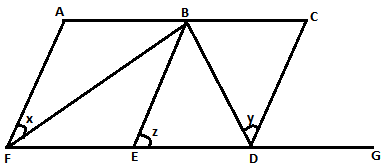6th Grade > Mathematics
PLAYING WITH NUMBERS MCQs
:
A factor of a number is an exact divisor of that number.
:
Definition: 1 Mark
Steps: 1 Mark
Solution: 1 Mark
A Common Multiple is a number that is a multiple of two or more numbers.
We can find all the factors of 16, as shown below.
16=1×16
16=2×8
16=4×4
Since the number is divisible by 16, it will also be divisible by its factor i.e. 1, 2, 4, 8, 16.
So, clearly, the number which is divisible by 16, will also be divisible by 1, 2, 4, 8.
:
Steps: 1 Mark
Answer: 1 Mark
Oshin can distribute the chocolates by finding the factors of 36: Each of the factors will divide the chocolates in an equal number of parts, So each child will get an equal number of chocolates.
We can find the factors of 36 in the following way:
36=1×36
36=2×18
36=3×12
36=4×9
36=6×6
Stop here, because both the factors (6) are same.
Thus, the factors are 1, 2, 3, 4, 6, 9, 12, 18 and 36. So she can distribute in 9 possible sets, depending on how many children form one set.
:
Steps: 1 Mark
Solution: 1 Mark
The dimensions of the garden can be found by finding the factors of the number 256.
The various factors of 256 are as follows:
256=1×256
256=2×128
256=4×64
256=8×32
256=16×16
We will stop at (16,16), because they are equal.
∴ The various dimensions of the garden can be, (1,256),(2,128),(4,64),(8,32),(16,16).
:
Concept: 1 Mark
Steps: 2 Marks
Solution: 1 Mark
The given numbers are 2,4,6,8,10 and 12.
The factors of the given numbers are:
2=1×2
2=2×2
6=2×3
8=2×2×2
10=2×5
12=2×2×3
Now ,the maximum number of times prime factor 2 occurs is 3,
the maximum number of times prime factor 3 occurs is 1,
the maximum number of times prime factor 5 occurs is 1.
So, LCM=2×2×2×3×5 = 120
L.C.M. of 2, 4, 6, 8, 10 and 12 is 120.
So, the bells will toll together after every 120 seconds (2 minutes).
In 30 minutes, they will toll together 302 + 1 = 16 times.
:
Steps: 3 Marks
Answer: 1 Mark
The greatest number of 4-digits is 9999.
The prime factors of the given numbers are:
15=3×5
25=5×5
40=2×2×2×5
75=3×5×5
The maximum number of times the prime factor 2 occurs is 3.
The maximum number of times the prime factor 3 occurs is 1.
The maximum number of times the prime factor 5 occurs is 2.
∴ The LCM of the given numbers=2×2×2×3×5×5
L.C.M. of 15, 25, 40 and 75 is 600.
On dividing 9999 by 600, the remainder is 399.
Required number (9999 - 399) = 9600.
:
Smallest Number: 1 Mark
Highest Common factor: 2 Marks
The first four prime numbers are 2, 3, 5, 7.
1 is neither a prime nor a composite number so we will not include that.
Now, all these numbers are prime numbers, so the smallest number possible which is a factor of these numbers is the lowest common multiple of these numbers.
Since these are all prime numbers, their lowest common multiple is the product of these numbers, which is:
2 × 3 × 5 × 7 = 210
Hence, 210 is the required number.
The given numbers are prime numbers, so all of them will have the highest common factor equal to 1.
:
Formula: 1 Mark
Steps: 2 Marks
Answer: 1 Mark
For a minimum number of biscuits, first, we find the LCM of 12, 15 and 21.
The prime factors of the following numbers are:
12=2×2×3
15=3×5
21=3×7
The maximum number of times the prime factor 2 occurs is 2.
The maximum number of times the prime factor 3 occurs is 1.
The maximum number of times the prime factor 5 occurs is 1.
The maximum number of times the prime factor 7 occurs is 1.
∴ LCM= 3 × 4 × 5 × 7 = 420
∴ Minimum number of packets of brand A =42012=35
Minimum number of packets of brand B =42015=28
And minimum number of packets of brand C =42021=20
:
Concept: 1 Mark
Steps: 2 Marks
Answer: 1 Mark
The greatest capacity of a tin is the HCF of 120, 180 and 240 liters.
The prime factorisation of the given numbers is :
120=2×2×2×3×5
180=2×2×3×3×5
240=2×2×2×2×3×5
Hence the highest common factor of 120,180,240=2×2×3×5
∵ Highest common factor of 120, 180 and 240 is 60.
∴ Required HCF = 60 litres.
∴ Greatest capacity of a tin = 60 litres.

















